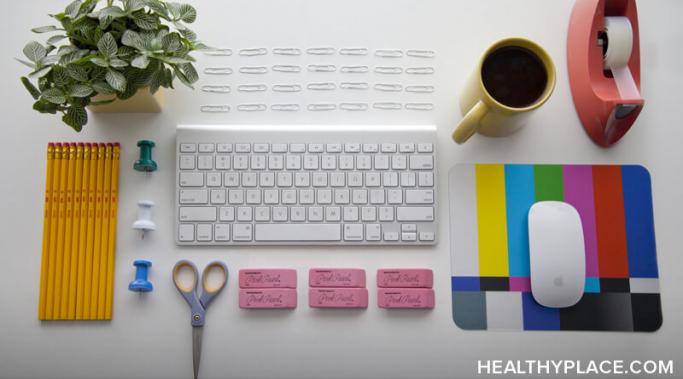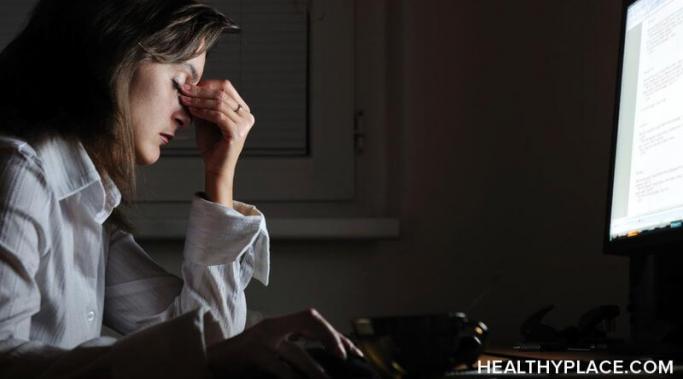I can't work full time, but I do work. Here’s the thing: I am an entrepreneur for the usual reasons, like passion and flexibility. But I am also an entrepreneur because I struggle to hold down a full-time job. Yes, you read that right. I am an entrepreneur because I cannot work full-time. And the reason I cannot work full-time is that I have major depression. Let me explain.
Work and Bipolar or Depression
On most days, I am an individual without debilitating depression. But every now and then, there comes a time when depression completely takes over my body and mind. My arms ache and feel limp and my mind fixates on nothing but suicide. That is when I know I am officially too depressed to work and taking a mental health day seems like the best option.
Hello, my name is Mahevash Shaikh and I am thrilled to join the "Work and Bipolar or Depression" blog at HealthyPlace. I was diagnosed with major depression in 2018 at the not-so-tender age of 27. But way before an official diagnosis, I always knew in my gut that I was suffering from this mental disorder. Gut feelings like these have a way of coming true, don’t they? Also, it was the only reasonable explanation for why I felt so inexplicably low at times. It was either that or teenage mood swings. Irrespective of the reason, I definitely did not buy into the theory that I was “being ungrateful.”
Fatigue at work often interferes with your job when you have depression. When you are constantly exhausted, it’s hard to focus on your job, and depending on what you do, this can be dangerous. If fatigue because of depression at work is a problem for you, it’s important to take steps to manage it. In this post, I will go over habits to establish to help you manage exhaustion, as well as some quick tips for dealing with fatigue at work.
Making friends at work when you have depression is important because social support is an integral part of a healthy life. Even the most introverted among us need friends. Depression inherently affects the way we interact with others. Feelings of loneliness are a common sign of depression and the symptoms of depression often result in the desire to isolate yourself, which only further compounds the feeling of being alone. It can feel impossible to reach out when you're depressed, but if you can establish a healthy support network, you have a lifeline during moments when it feels like depression is encompassing your whole world. This is particularly beneficial at work, where you spend most of your time. This is why it’s in your best interest to try to make friends at work, even with depression.
Setting boundaries at work is important, but, as someone with depression, I have often struggled to set boundaries. It’s an important part of self-care when you’re depressed, but it’s not always easy, especially at work. You need to advocate for yourself, but you also don’t want to risk being fired, and if you also have an anxiety disorder like me, that might be a very real fear. That being said, if you are proactive and communicate clearly and professionally, you can successfully set boundaries at work and be happier and healthier for doing so.
Letting go of perfectionism can be difficult, but it's important because perfectionism is a nightmare. It makes it impossible to be satisfied with your accomplishments (or to accomplish anything at all) because it will never be good enough. I used to have a terrible problem with perfectionism. I would have these great ideas but never follow through with them because I couldn’t execute them perfectly. This perfectionist paralysis held me back from a lot of success, especially in the workplace. Now I have come to accept the philosophy, “Done is better than perfect.” You have to let go of the idea that perfection is attainable. However, that is easier said than done, especially for someone with depression.
Sometimes you have to talk to your boss about depression. It might be difficult for you to imagine talking to some of your friends about your depression, much less your boss. Personally, I have disclosed my depression to my bosses at several different jobs, and it was never easy, but it was always worth it. Before you jump into this tough conversation, there are several factors you should consider.
My name is Virginia Boyles and I am one of the authors of the Work and Bipolar or Depression blog on HealthyPlace. I was first diagnosed with depression and generalized anxiety disorder when I was 16 years old in 2007. My struggle with mental illness has inspired me to help others with similar experiences empower themselves to make healthy choices. I believe that the more open we are about our struggles with mental health, the less mental illness stigma we face, and therefore, the more we have the social support we need to thrive.
Being self-employed presents a number of challenges. If you compound being self-employed with having a mental illness, it can be a very difficult dynamic. However, the dynamic may work better than a traditional employment situation for someone living with depression.









